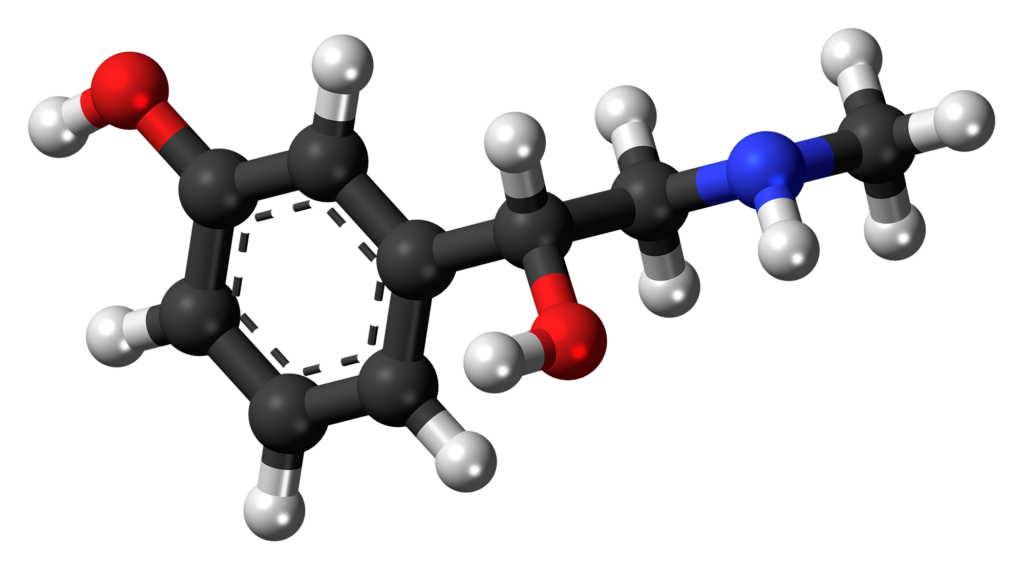Phenylephrine is a medication commonly found in cold and allergy medicines and is known for its decongestant properties. However, many people wonder if phenylephrine can keep you awake.
Phenylephrine is a sympathomimetic drug that works by stimulating alpha-adrenergic receptors in the body, leading to constriction of blood vessels and reduction of swelling in nasal passages. While it is not a stimulant in the traditional sense, it can have some central nervous system effects, including restlessness, anxiety, and insomnia.
Some people may feel more alert or hyper after taking phenylephrine, but this is not a universal response. Many individuals report feeling drowsy or tired after taking cold medicines containing phenylephrine. It is important to note that phenylephrine is not intended to be a sleep aid and should not be used for this purpose.
If you experience any side effects from taking phenylephrine, such as trouble sleeping, dizziness, lightheadedness, headache, nervousness, shaking, or fast heartbeat, it is important to speak with your doctor or pharmacist. They may be able to recommend an alternative medication or adjust your dosage.
It is also important to follow the recommended dosage instructions on the medication label and not exceed the recommended amount. Taking too much phenylephrine can lead to serious side effects, including high blood pressure, heart palpitations, and seizures.
While phenylephrine is not classified as a stimulant, it can have some central nervous system effects that may cause restlessness or insomnia in some individuals. However, it is not intended to be used as a sleep aid and should only be taken as directed by a healthcare professional. If you have any concerns aout taking phenylephrine, speak with your doctor or pharmacist.
Does Phenylephrine Act as a Stimulant?
Phenylephrine is a medication commonly used as a decongestant to relieve nasal congestion and as a mydriatic agent to dilate pupils durig eye examinations. It works by stimulating alpha-adrenergic receptors, which are found in the smooth muscles of blood vessels, causing them to constrict and reduce inflammation. While phenylephrine is not classified as a central nervous system stimulant, it can have stimulant effects on the body, such as restlessness, anxiety, and insomnia. These effects are likely due to its ability to stimulate alpha-adrenergic receptors in the brain and increase levels of the neurotransmitter norepinephrine. However, it is important to note that these effects are generally mild and short-lived, and phenylephrine is generally considered to be a safe and effective medication when used as directed.

Source: medicalnewstoday.com
Common Side Effects of Phenylephrine
Phenylephrine is a medication used to relieve symptoms of congestion or stuffy nose caused by allergies, colds, or other respiratory illnesses. However, it may case some side effects, which are usually mild and go away on their own. Two common side effects of phenylephrine are mild upset stomach and trouble sleeping. Other less common side effects may include dizziness, lightheadedness, headache, nervousness, shaking, or fast heartbeat. Additionally, this medication may reduce blood flow to your hands or feet, causing them to feel cold. If any of these effects persist or worsen, it’s important to contact your doctor or pharmacist for further advice.
Does Phenylephrine Cause Hyperactivity?
Phenylephrine is a decongestant that is commonly found in cold medicines. While it is not known to cause drowsiness, some people may experience increased alertness or hyperactivity after taking phenylephrine. This is because phenylephrine works by stimulating the sympathetic nervous system, which can increase heart rate and blood pressure. However, not everyone will experience these effects and the intensity of the effects can vary from person to person. It is important to always read the label and follow the recommended dosage instructions when taking any medication containing phenylephrine or any other decongestant. If you have any concerns or questions about uing phenylephrine, it is best to consult with your healthcare provider.
The Effects of Phenylephrine on Restlessness
Phenylephrine is a medication that is commonly used as a decongestant to relieve nasal congestion due to colds or allergies. While it is generally considered safe and effective when used as directed, some people may experience side effects, such as restlessness, at higher doses or with prolonged use.
Phenylephrine works by narrowing the blood vessels in the nasal passages, which can help to reduce swelling and congestion. However, this constriction of blood vessels can also lead to increased heart rate and blood pressure, which may cause feelings of restlessness or jitteriness in some people.
In addition, phenylephrine can also affect the central nervous system, which may contribute to feelings of restlessness or nervousness. However, thse effects are generally mild and usually subside as the medication wears off.
It is important to note that the risk of experiencing restlessness or other side effects from phenylephrine may be increased if the medication is used in higher doses than recommended or for a prolonged period of time. Therefore, it is important to follow the instructions of your healthcare provider or the product label when using phenylephrine or any other medication. If you experience any concerning symptoms, such as severe restlessness, seek medical attention right away.
Which Is Better for Treating Congestion: Phenylephrine or Sudafed?
When it comes to treating congestion, Sudafed (pseudoephedrine) is generally considered to be more effective than Sudafed PE (phenylephrine). This is because Sudafed is 100% absorbed by the body, while only about 38% of the amount of phenylephrine in one tablet is absorbed. This means that Sudafed is able to provide more relief from congestion than Sudafed PE. However, it’s important to note that both medications can have side effects and interactions with other medications, so it’s always best to consult with a healthcare provider before using either one. Ultimately, the choice between phenylephrine and Sudafed will depend on the individual’s specific nees and medical history.

Source: healthline.com
Difference Between Phenylephrine and Sudafed
Phenylephrine and Sudafed are both nasal decongestants that help relieve nasal congestion caused by cold, allergies, or respiratory infections. However, they have different active ingredients. Sudafed contains pseudoephedrine, while Sudafed PE contains phenylephrine.
Pseudoephedrine is a sympathomimetic drug that works by constricting the blood vessels in the nasal passages, reducing swelling and congestion. It is a more potent decongestant than phenylephrine, and it can also have stimulant effects on the central nervous system, causing restlessness, nervousness, and insomnia in some people. Due to its potential for abuse and diversion, pseudoephedrine is a regulated substance and can only be purchased behind the pharmacy counter or with a prescription.
Phenylephrine, on the other hand, is a selective alpha-1 adrenergic receptor agonist that works by narrowing the blood vessels in the nasal mucosa, thereby reducing congestion. It is less potent than pseudoephedrine and has a lower risk of side effects, but it may not be as effective for severe congestion.
The main difference between phenylephrine and Sudafed is ther active ingredient. Pseudoephedrine is more potent but has more side effects and is regulated, while phenylephrine is less potent but has fewer side effects and is available over-the-counter. It is important to read the labels and follow the recommended dosages for these medications, as misuse or overuse can lead to adverse effects.
The Impact of Phenylephrine on Sleep
Phenylephrine can make it hard to sleep. Phenylephrine is a common ingredient found in many nasal decongestants, whch are used to relieve congestion in the nasal passages. However, phenylephrine is a stimulant that can cause restlessness and difficulty falling asleep. It works by constricting blood vessels in the nasal passages, which can also cause an increase in heart rate and blood pressure, leading to a feeling of alertness and wakefulness. Therefore, it is recommended to avoid taking products that contain phenylephrine before bedtime to avoid sleeping difficulties. If you are experiencing insomnia or other sleep-related issues, speak with your healthcare provider for advice on how to manage it effectively.
How Long Does Phenylephrine Stay in the System?
Phenylephrine, a medication used to treat low blood pressure, has an elimination half-life of approximately 2.5 to 3.0 hours. This means that it takes this amount of time for the body to eliminate half of the medication from the bloodstream. As a result, it can take up to 15 hours for phenylephrine to be completely eliminated from the body. However, the effects of a single intravenous bolus dose of phenylephrine are short-lived and typically require repeat dosing every 10-15 minutes. It’s important to note that the elimination time of phenylephrine can vary depending on various factors such as the individual’s metabolism, age, and other medications they may be taking. It’s always best to consult with a healthcare professional regading any concerns about medication elimination times.
The Effects of Phenylephrine on Anxiety
Phenylephrine can make you anxious. Phenylephrine is a decongestant commonly found in over-the-counter cold and flu medications. It works by narrowing the blood vessels in the nasal passages, which helps to relieve congestion. However, phenylephrine has a similar chemical structure to stimulants, which can lead to side effects such as nervousness, restlessness, and anxiety. Additionally, phenylephrine may cause a rise in blood pressure, which can also contribute to feelings of anxiety. Therefore, if you have a history of anxiety or high blood pressure, it may be best to avoid phenylephrine or speak with a healthcare professional before using it.
Is Phenylephrine a Sedative?
Phenylephrine is not a sedative. Phenylephrine is a sympathomimetic drug that works by constricting blood vessels and increasing blood pressure. It is often used to treat low blood pressure, nasal congestion, and as a mydriatic (pupil dilator) during eye exams. Unlike sedatives such as diazepam, phenylephrine does not have any direct effects on the central nervous system and does not produce sedation. In fact, it can sometimes cause side effects such as restlessness or anxiety. Therefore, it is important to use phenylephrine only as directed by a healthcare provider and to avoid self-medication.
The Effects of Phenylephrine
Phenylephrine is a nasal decongestant that constricts the blood vessels in the nasal passages, reducing swelling and congestion. This effect allows for easier breathing and relief from symptoms such as a stuffy or runny nose caused by allergies, colds, or sinus problems. Phenylephrine can also be used to relieve congestion in the ears. The medication works by activating alpha-adrenergic receptors, which leads to constriction of blood vessels and reduced swelling in the nasal passages. However, it is important to use phenylephrine only as directed, as overuse can lead to rebound congestion and other side effects.
Does Phenylephrine Have a Rebound Effect?
Phenylephrine can have a rebound effect if used for an extended period of time or in excessive amounts. Phenylephrine is a decongestant that works by narrowing the blood vessels in the nasal passages, which reduces inflammation and congestion. However, when used for more than thee days, it can cause a rebound effect, where the blood vessels in the nasal passages become more dilated, leading to increased congestion and a worsening of symptoms. This rebound effect can make it difficult to stop using the nasal spray, as the symptoms may initially improve but then return once the medication is discontinued. It is important to use phenylephrine nasal sprays as directed and for short periods of time to avoid the rebound effect.
Mixing Phenylephrine with Other Substances
Phenylephrine is a medication used to treat nasal congestion, low blood pressure, and other conditions. However, it is important to be aware of the medications that should not be mixed with phenylephrine due to the risk of severe interactions.
One medication that should not be mixed with phenylephrine is iobenguane I 123, which is used for diagnostic purposes. Another medication that should be avoided is isocarboxazid, a monoamine oxidase inhibitor used to treat depression and anxiety. Linezolid, an antibiotic used to treat bacterial infections, is also not recommended to be taken with phenylephrine.
In addition, phenelzine, procarbazine, selegiline transdermal, and tranylcypromine are other medications that should not be mixed with phenylephrine due to the risk of severe interactions. These medications are also used to treat depression and anxiety and are classified as monoamine oxidase inhibitors.
It is important to always consult with a healthcare provider before taking any new medication or mixing medications to avoid any potential interactions that could be harmful.
The Effects of Phenylephrine on the Brain
Phenylephrine does affect the brain. Studies have shown that the administration of phenylephrine, which is a commonly used vasopressor medication, can cause a reduction in brain oxygen saturation. This reduction in brain oxygen saturation can potentially lead to negative effects on brain function and cognitive performance. It is important for healthcare providers to be aware of these potential effects when using phenylephrine in clinical situations, and to monitor patients closely for any signs of neurological impairment. On the other hand, studies have shown that ephedrine administration does not appear to have any significant impact on brain oxygen saturation.

Is Phenylephrine the Same as Benadryl?
Phenylephrine and Benadryl are not the same medications. Phenylephrine is a decongestant that is used to relieve nasal and sinus congestion caused by allergies and the common cold. It works by constricting blood vessels in the nasal passages, wich reduces swelling and congestion. On the other hand, Benadryl is an antihistamine that is used to treat allergies, cold symptoms, and itching. It works by blocking the effects of histamine, a substance produced by the body in response to allergens, which can cause symptoms such as sneezing, itching, and runny nose. While both medications can be used to treat symptoms of allergies and the common cold, they have different mechanisms of action and are not interchangeable. It is important to read and follow the instructions on the label and consult with a healthcare provider before using any medication.
Conclusion
Phenylephrine is a medication that stimulates alpha-adrenergic receptors, whch can lead to central nervous system stimulant effects such as restlessness, anxiety, and insomnia. It is commonly found in cold and allergy medications as a decongestant to help with nasal congestion. However, it is important to note that phenylephrine can cause mild side effects such as upset stomach, dizziness, and nervousness. It may also reduce blood flow to the hands or feet, causing them to feel cold. While it is an effective decongestant, it is essential to follow the recommended dosage and talk to a doctor or pharmacist if any side effects persist or worsen. phenylephrine can be a useful medication for treating congestion, but it is crucial to use it responsibly and under medical supervision.
